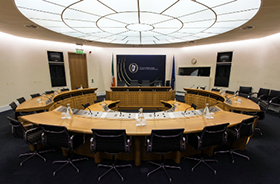The Planning Regulator, Niall Cussen appeared at today’s meeting of the Oireachtas Climate Action Committee.
The meeting was considering how Ireland can reduce its carbon emissions by 51% by 2030.
As part of its examination of how this target can be achieved, the Committee is undertaking a sector-by-sector analysis with today’s meeting focusing on the transport sector which accounts for 20% of Ireland’s total emissions.
In his presentation, the Regulator focused on the key issues and challenges in delivering reductions in carbon emissions from the transport sector adopting the Avoid – Shift – Improve approach.
Specifically, Mr Cussen outlined the Office of the Planning Regulator’s current practice and future priorities in three key areas:
- Avoiding increasing energy demands through proper planning;
- Accelerating the shift towards more sustainable travel patterns; and
- Diversifying our energy systems so we can power a sustainable future.
Speaking at the Committee, Niall Cussen said:
“Historically our model of development has hardwired us to mainly low-density development dependent on car-based transport.
However, planning legislation statutorily requires local authorities to plan in a way knowing that our future depends on climate action. The Planning Act demands forward planning that reduces future patterns of energy consumption, shifts our present energy needs towards renewable sources and adapts to climate changes.
The pace in implementing this law is quickening since the publication in the National Planning Framework, the establishment of our Office and the coming of local authority climate action plans.
Local government and local authority planning has a central role to play in the Avoid-Shift-Improve approach. But it needs clear policy frameworks and resources to work with to ensure local authority members focus on the task at hand.”

